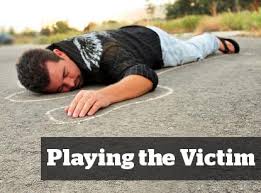Who Wants to be a SUCKER???
We all want to believe that the people in our lives whom we love are always honest and above-board with us. We would be appalled to believe that they might "lie" to us in order to gain our sympathy or help, or take advantage of us for their own personal gain, no matter what the cost to us (sometimes, in these instances we are referred to as "sucker"s).

Two Basic Types of Aggression
There are two basic types of aggression:
overt-aggression and
covert-aggression. When you're determined to have something and you're open, direct and obvious in your manner of fighting, your behavior is best labeled
overtly aggressive. When you're out to "win," dominate or control, but are subtle, underhanded or deceptive enough to hide your true intentions, your behavior is most appropriately labeled
covertly aggressive. Now, avoiding any overt display of aggression while simultaneously intimidating others into giving you what you want is a powerfully manipulative maneuver. That's why covert-aggression is most often the vehicle for interpersonal manipulation. ~
http://www.rickross.com/reference/brainwashing/brainwashing11.html
Be mindful of those who
would try to manipulate you. Unfortunately, it’s those who are closest to us
who have the greatest edge when it comes to “yanking our chains” or “gaining
our sympathy.”
Manipulation is a mind game
used for the purpose of controlling others. SOMETIMES, it can be an
unintentional thing. But oftentimes, the manipulation is diabolically intentional.
HOW DO THEY DO IT?
What are the techniques these manipulative people use in their interactions with us?
Scaring The Hell Out of You: The Fear-Then-Relief Procedure
What it is: Arguably the most evil manipulative technique is what psychologists call the "
fear-then-relief technique." The technique preys on a person's emotions. Here, the manipulator causes someone a great deal of stress or anxiety and then abruptly relieves that stress. After this sudden mood swing, the person is disarmed, less likely to make mindful or rational decisions, and more likely to respond positively to various requests.
Examples: The book
The Science of Social Influence details a few experiments that showed this in action. In one, shoppers in a mall were scared by a stranger touching their shoulder from behind. When they turned around, the shoppers found that their assailant was a (supposed) blind man who just wanted to ask the time. After that deflection and relief, someone else—the fake blind man's confederate—asked the targets if they would buy and sign postcards for a political charitable cause. Those who had met the blind man and experienced the fear-then-relief rollercoaster were more likely to do so than the control group which wasn't manipulated.

This fear-then-relief manipulation technique is most popularly portrayed in the classic bad cop/good cop routine: one person scares the hell out of you, another saves you, and then you're more willing to talk. You see this in everyday life, too—from the fear tactics of insurance agents to bad managers who suggest your job is on the line, backtrack, and then ask you to work overtime.
Photo byjabneyhastings
Making You Feel Guilty: Social Exchange
What it is: One strategy con artists and unethical marketers use is simply called "social exchange." The book
The Dynamics of Persuasion describes it as:
an interpersonal persuasion strategy in which Person A provides Person B with a tangible or psychological reward; in exchange, when Person A approaches B with a request for compliance, B feels pressure to comply.
Exchanging favors and doing things for others is a basic part of human society, but this can be manipulated by aggressive people.
Examples: A co-worker could remind you about that time they bailed you out big time in the past, then use that as leverage every time he/she needs something. Or someone who loaned you money or knows a secret of yours could continually blackmail you into doing what they want (a subject
we've covered extensively).
Photo by Jhayne
Priming You With a Small Request: The Foot-in-the-Door Technique
What it is: This manipulation technique is evil because it's so tricky, subtle, and simple. With the
foot-in-the-door method, someone asks you to do a very small and easy request and then follows up with the real request.
 Examples
Examples:
NPR gives an example of a panhandler who asks you for the time, then asks you to spare a buck. By getting you to say yes to one request, you're more likely to say yes to a second one.
Photo by clarity
Avoiding These Manipulations
Just knowing about manipulative techniques can help you avoid falling victim to them. For the fear-then-relief technique, for example, be on the lookout whenever you feel a surge in negative and then positive emotions. You're more vulnerable at that time to do things mindlessly and at the suggestion of others. Watch out for statements that follow this general formula:[Something terrible] could have happened to you, but it [didn't/won't]. [Now do this]. These aren't the only ways someone could trick you into saying yes, of course, but they are some of the more common—just keep an eye out, stay on your toes, and you should be able to spot when someone's trying to pull a fast one.
Here are some other tried-and-true ways to get people who trust you to do what you want:
OUCH, it hurts to be manipulated by the people you thought loved and/or cared about you!
How to Tell if Someone is Manipulating You
http://www.revitalizecounselingservices.com/2012/10/how-to-tell-if-someone-is-manipulating.html

Manipulative Techniques
by Anita Anand
How do you tell if someone is a manipulator? Or if you yourself have manipulative tendencies? Simon identified the following manipulative techniques:
• Lying: It is hard to tell if somebody is lying at the time, although often the truth may be apparent later when it is too late. One way to minimise the chances of being lied to, is to understand that some personality types (particularly psychopaths) are experts at the art of lying and cheating, doing it frequently, and often in subtle ways.
• Lying by omission: This is a very subtle form of lying by withholding a significant amount of the truth. This technique is also used in propaganda.
• Denial: The manipulator refuses to admit that he or she has done something wrong.
• Rationalisation: An excuse made by the manipulator for inappropriate behaviour.
• Minimisation: This is a type of denial coupled with rationalisation. The manipulator asserts that his or her behaviour is not as harmful or irresponsible as someone else was suggesting – for example saying that a taunt or insult was only a joke.
• Selective inattention or selective attention: The manipulator refuses to pay attention to anything that may distract from his or her agenda, saying things like “I don't want to hear it.”
• Diversion: The manipulator not giving a straight answer to a straight question and instead being diversionary, steering the conversation onto another topic.
• Evasion: Similar to diversion but giving irrelevant, rambling, vague, and weak responses.
• Covert intimidation: The manipulator throwing the victim onto the defensive by using veiled (subtle, indirect, or implied) threats.
• Guilt tripping: A special kind of intimidation tactic. A manipulator suggests to the conscientious victim that he or she does not care enough, is too selfish or has it easy. This usually results in the victim feeling bad, keeping them in a self-doubting, anxious and submissive position.
• Shaming: The manipulator uses sarcasm and put-downs to increase fear and self-doubt in the victim. Manipulators use this tactic to make others feel unworthy and therefore defer to them. Shaming tactics can be very subtle such as a fierce look or glance, unpleasant tone of voice, rhetorical comments, and subtle sarcasm.
Manipulators can make one feel ashamed for even daring to challenge them. It is an effective way to foster a sense of inadequacy in the victim.
• Playing the victim role (“poor me”): The manipulator portrays himself or herself as a victim of circumstance or of someone else’s behavior in order to gain pity, sympathy or evoke compassion and thereby get something from another. Caring and conscientious people cannot stand to see anyone suffering and the manipulator often finds it easy to play on sympathy to get cooperation.

• Blaming the victim: More than any other, this tactic is a powerful means of putting the victim on the defensive while simultaneously masking the aggressive intent of the manipulator.
• Playing the servant role: Cloaking a self-serving agenda in guise of a service to a more noble cause. For example saying, he is acting in a certain way for ‘obedience’ and ‘service’ to God or a similar authority figure.
• Seduction: The manipulator uses charm, praise, flattery or overtly supports others, in order to get them to lower their defenses, and give their trust and loyalty to him or her.
• Projecting the blame (blaming others): The manipulator often finds scapegoats, in subtle, hard-to-detect ways.

• Pretending innocence: The manipulator tries to suggest that any harm done was unintentional or did not do something that they were accused of. The manipulator may put on a look of surprise or indignation. This tactic makes the victim question his or her own judgment, and possibly his own sanity.
• Pretending confusion: The manipulator tries to play dumb by pretending he or she does not know what you are talking about, or is confused about an important issue brought to his attention.
• Brandishing anger: The manipulator uses anger to brandish sufficient emotional intensity and rage to shock the victim into submission. The manipulator is not actually angry, he or she just puts on an act. He just wants what he wants and gets angry when denied.
It is embarrassing for an intelligent person to admit they have fallen prey to another's manipulative behavior.
It is difficult to comprehend that someone who is loved or in an inner circle of confidentiality would disregard another's feelings or dignity, which makes me wonder if those who manipulate in this way aren't SOCIOPATHS:
People suffering from sociopathy, or antisocial personality disorder, may display a wide range of behaviors associated with the disorder, which generally causes them to have an overall disregard for the needs and rights of others. One of the primary symptoms of sociopathy is chronic lying, which is often used to manipulate others. Sociopaths do not feel guilt or remorse for hurting other people, though they are often superficially charming and likable. They typically see themselves as superior to other people, and have a general disregard for societal norms and rules. They also tend to be impulsive, making irresponsible decisions and engaging in behaviors that hurt other people.
Pathological lying is one of the symptoms of sociopathy that most patients display. Sociopaths are highly manipulative and will do anything to get others to do what they want. This often includes lying, either directly or by pretending to think or feel things they really do not. In most cases, they are extremely convincing and able to fool others into believing them.
A lack of feeling of regret or shame is another of the symptoms of sociopathy. People with the condition often use or hurt other people for their own benefit and have no concern for how this makes them feel. They themselves typically only feel very shallow emotions, and are not really capable of loving others; they are also not usually capable of empathy and in fact show scorn for emotion in others. They are often good at pretending to be pleasant and likable, however, and can typically mask their true nature when interacting with people.
Most people with sociopathy are highly egocentric, with an inflated sense of superiority. They consider themselves to be better than everyone else, which typically means they have little regard for the rules and ethics of society. Their behavior often reflects an overall scorn for societal norms, and an overall sense of entitlement due to their idea that they are superior to others.
Another of the symptoms of sociopathy is impulsivity and irresponsibility. Many sociopaths will make decisions quickly, with little or no regard to the consequences, as long as they get what they want at the time. This can lead them to engage in dangerous or damaging behaviors such as doing drugs, being sexually promiscuous, or physically abusing others. In many cases, sociopaths have a history of juvenile delinquency associated with engaging in these types of reckless behaviors.





















 Examples:
Examples: 
